You've heard the AI-generated podcasts and seen the flawless video narrations. Behind the scenes, a powerful technology is at work: AI voice cloning. Once the stuff of science fiction, this technology is now accessible to content creators, marketers, and developers - and many of the most promising tools offer free tiers to get you started.
But with so many options available, how do you know which one is right for your project? The landscape is constantly changing, with platforms offering different levels of quality, features, and free usage. Whether you're a podcaster making quick edits, a YouTuber creating multilingual content, or a developer building a conversational AI, finding the perfect tool requires careful consideration.
This comprehensive guide breaks down 10 of the best free and freemium AI voice cloning options on the market. We'll dive into the specifics of each tool, highlighting its strengths, weaknesses, and what makes it unique. By the end, you'll have a clear roadmap to choose the software that best fits your needs, without spending a dime upfront.

1. ElevenLabs
An Overall Best AI Voice Cloning Software for High-Quality Voice Generation
ElevenLabs is a leading AI voice technology company known for its high-quality, realistic voice generation, which is used for a wide range of applications, including content creation, audiobooks, and virtual assistants. It is frequently cited as one of the best AI voice platforms on the market.
It is the best option for content creators, developers, and businesses that require high-quality, realistic, and emotionally expressive voiceovers. Its advanced features, like Professional Voice Cloning and AI dubbing, make it ideal for producing polished audiobooks, podcasts, and video voiceovers. However, users should plan for a paid subscription if voice cloning or commercial use is needed.
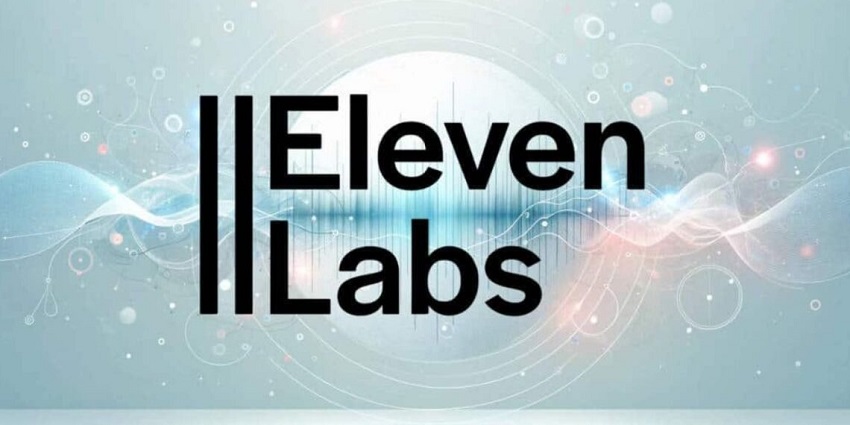
Key Features
1. Voice Cloning
ElevenLabs offers two methods for cloning voices, though neither is available on the free plan.
- Instant Voice Cloning (IVC): A quick and easy method that requires just 60 seconds of a clear, single-speaker audio sample. It provides a fast way to get a usable voice clone but is of a lower quality than the professional version. IVC is included with the paid "Starter" plan.
- Professional Voice Cloning (PVC): This advanced feature creates a high-fidelity, hyper-realistic voice replica. It requires more substantial training data, with a minimum of 30 minutes and an optimal time of 3 hours of clean audio. A "Voice Captcha" verification process is also required to ensure you have the rights to clone the voice. This feature is available starting with the "Creator" plan.
2. Text-to-Speech (TTS)
ElevenLabs is highly regarded for its text-to-speech engine, which produces voices with a broad emotional range and natural-sounding intonation and pacing. This makes it suitable for professional-grade content.
The platform offers a large library of pre-made AI voices that users can customize. Users can also create entirely new synthetic voices by describing the desired characteristics, such as age, gender, accent, and pitch.
3. Multilingual Support
The platform's multilingual model allows for voice generation in over 30 languages while maintaining the context and emotion of the speaker.
4. Other Tools
- AI Dubbing and Translation: ElevenLabs can automatically translate and dub audio and video content while attempting to preserve the original speaker's voice characteristics.
- Voice Isolator: A tool that helps clean up recordings by removing background noise to leave only the clear speaker's voice.
- Conversational AI Agents: These can be integrated into websites and applications for automated customer service or interactive experiences.
5. Free Plan
ElevenLabs offers a "Free" plan with 10,000 characters per month for text-to-speech generation, which is roughly equivalent to 10 minutes of audio. It does not include voice cloning and is for non-commercial use only.
- Highest quality voice synthesis: Widely recognized for producing realistic and emotionally nuanced voices.
- Intuitive Interface: The platform is generally easy for users of all skill levels to navigate.
- Versatile applications: Useful for content creation, customer service, education, and entertainment.
- Flexible pricing: Usage-based billing and rollovers are available on some paid plans, so credits don't expire monthly.
- Free plan limitations: The free version is useful for testing but does not allow voice cloning or commercial use.
- Requires high-quality audio input: For best results, particularly with Professional Voice Cloning, clean, studio-quality audio is necessary. Low-quality or inconsistent input will result in a poor clone.
- Accents can be overlooked: Some users have reported that the AI may fail to accurately replicate some accents, instead opting for a more neutral-sounding voice.
- Credit consumption and cost: Users report that credits can burn quickly, especially on failed generations. For serious projects, the real cost may be higher than advertised.
2. Descript
Best AI Voice Cloning Software for Podcasters and YouTubers
Descript is an AI-powered audio and video editing platform that has gained popularity for its innovative "text-based editing" workflow. Its voice cloning feature, called Overdub, is seamlessly integrated into this editing process, making it especially useful for content creators like podcasters and video editors who need to make quick corrections.
Descript is best for podcasters, YouTubers, and video editors who need a complete production suite with integrated voice cloning for corrections and minor additions. If your primary goal is to edit a recording and make minor updates with your own voice, its unified workflow is highly efficient. For projects that require the most realistic, emotionally-nuanced voice generation for long narratives, other platforms might be a better fit.

Key Features
1. Text-Based Editing
The core of Descript's appeal is its ability to edit audio and video by simply editing the automatically-generated transcript. Deleting text removes the corresponding audio, and typing new text generates new audio using an AI voice, including your cloned one.
2. Overdub (Voice Cloning)
Overdub is ideal for fixing mistakes or inserting new sentences without needing to re-record in a studio. For instance, if you mispronounce a single word in a 30-minute podcast, you can just type the correct word, and Overdub will generate the replacement audio in your voice.
To create your custom voice clone, you must provide a minimum of 10 minutes of audio, though 30 minutes is recommended for higher quality. This can be a pre-recorded audio file or a recording you make directly within the app.
Descript prioritizes ethical use by requiring a consent statement from the person whose voice is being cloned. This ensures that the voice owner gives explicit permission for its use. While effective for corrections, reviewers note that Overdub's voice quality can be more robotic and less expressive than dedicated voice generation tools like ElevenLabs.
3. Other AI Suite of Tools
Descript includes a range of other AI-powered tools to enhance audio and video production:
- Studio Sound: This feature automatically removes background noise and enhances dialogue to produce clear, "studio-quality" audio.
- Filler Word Removal: Descript's AI can automatically detect and remove common filler words like "um" and "uh," helping to create a more polished recording.
- Collaboration: Teams can work together on a project, with different speakers automatically labeled in the transcript.
4. Free Plan
Descript also provides users with a free plan to try. The free plan offers a limited amount of Overdub usage, typically with a 1,000-word vocabulary limit for AI voices. It also includes one hour of transcription per month.
- Seamless integration: All-in-one platform for editing audio, video, and generating AI voices from a single text-based workflow.
- Simplified editing: The text-based editing approach is intuitive and significantly speeds up post-production for content creators.
- Ethical safeguards: The platform requires explicit consent for voice cloning, addressing common ethical concerns.
- Lower voice quality: Overdub's cloned voices are not as high-quality or emotionally expressive as those from competitors like ElevenLabs.
- Limited fine-tuning: Controls for adjusting pacing or emotional delivery are less granular compared to dedicated voice platforms.
- Learning curve: While the text-based editing is innovative, mastering the entire editing suite can take time.
- Reduced free offering: Recent changes to Descript's pricing have limited the AI features available on the free and lower-tier plans.
3. HeyGen
Best AI Voice Cloning Software for Creating AI Avatars
HeyGen is an AI video generation platform that specializes in creating realistic avatars and voiceovers from a simple script. While it does offer AI voice cloning, its key strength is the seamless combination of a generated voice with a lifelike, talking avatar. This allows users to produce professional-looking videos quickly without needing a camera, studio, or actors.
HeyGen is the best choice for marketers, businesses, and content creators who need to produce high-volume video content quickly and cost-effectively, especially if they are intimidated by being on camera. It is particularly valuable for creating marketing materials, educational videos, social media content, and personalized sales messages.
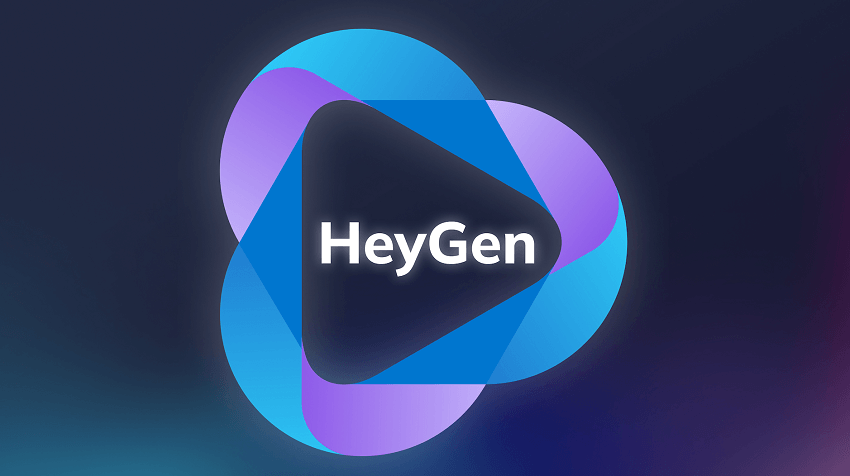
Key Features
1. AI avatars
HeyGen allows you to create a digital avatar of yourself or another person. You can choose to create either a simple "Instant Avatar" from a short video or a more professional, "Studio Avatar" that requires a more rigorous process to ensure high quality.
The platform also offers a large library of pre-designed, high-quality stock avatars in different styles and ethnicities that users can choose from to narrate their script. The newest iteration of HeyGen's technology, Avatar 4, can animate a simple still photo and turn it into a talking avatar with realistic facial expressions and timing.
2. Voice Cloning
You can clone a voice by uploading a clear audio or video file of the person speaking. The AI then replicates the original voice's tone, pitch, and style, which can be used to generate new audio from a text script. To clone a voice, HeyGen requires the voice owner to read a consent script to verify their identity and give permission. This ensures ethical and secure use of the voice.
While not as advanced in pure voice quality as a dedicated tool like ElevenLabs, HeyGen's voice generation is robust enough for video content. The platform also has an integration with ElevenLabs to allow users to incorporate high-fidelity voice clones directly into HeyGen videos.
3. Video Editing and Localization
Users can simply type or paste a script, and HeyGen's AI will generate a video of the selected avatar speaking the text with accurate lip-syncing. The platform also includes a library of video templates, backgrounds, and other elements that help streamline the video creation process. Besides, HeyGen can translate and localize a video's script and voiceover into dozens of languages, with the avatar's lips automatically syncing to the new language.
4. Free Plan
HeyGen offers a free plan that allows you to create a limited number of short videos (usually up to 3 minutes total) with a watermark. This is an excellent way to test the platform and create a few videos for non-commercial use.
- Focus on Video: As a video-first platform, HeyGen's core strength is producing integrated AI video with an avatar and voiceover.
- Efficient Workflow: The script-to-video process drastically reduces the time and cost associated with traditional video production.
- Excellent Localization: Its ability to translate video and automatically lip-sync to new languages is a powerful feature for reaching global audiences.
- Free plan limitations: The free version is a great starting point but is limited by a watermark and restricted video length.
- Variable voice quality: HeyGen's voice quality is generally good, but some reviewers find it less natural and emotionally nuanced than a dedicated voice generator like ElevenLabs.
- Credit system: Credits do not roll over on paid plans, which can be inefficient if usage is inconsistent.
4. Uberduck
Best AI Voice Cloning Software for A Web-Based Tool for Voice Cloning and Management
Uberduck is a popular AI voice platform, particularly for its connection to viral content and its unique focus on AI-generated singing and rapping. It has evolved significantly over time, transitioning from a platform known for its vast library of celebrity voices to a more creator-focused tool after facing intellectual property concerns.
Uberduck is a great choice for musicians, audio producers, and content creators who need to generate unique singing or rapping vocals. Its focus on musical expression and creative sound design makes it stand out for projects that go beyond simple narration. However, for those prioritizing the highest quality, emotionally nuanced spoken voice, other platforms might offer more reliable results.
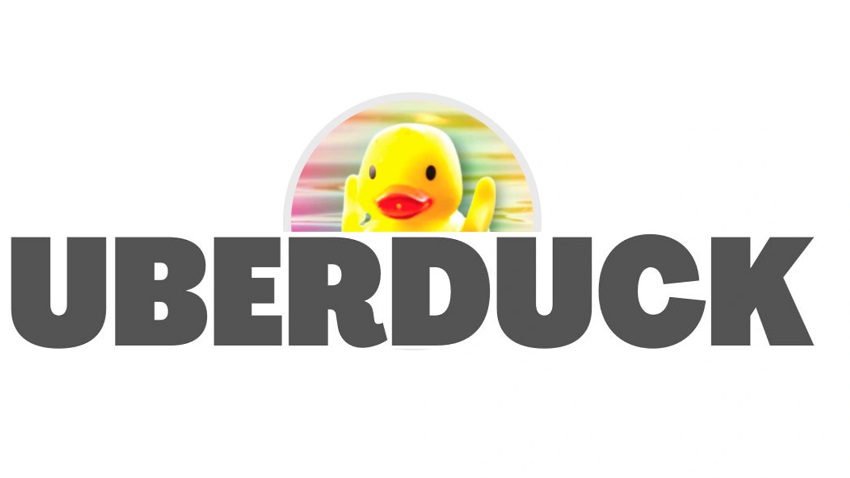
Key Features
1. Voice Cloning
Users can create custom voice models by uploading a high-quality audio sample. The AI analyzes the sample to replicate the speaker's tone, timbre, and accent. Uberduck highlights its fast voice cloning technology, claiming the ability to clone a voice in seconds. To ensure responsible use, the platform requires verification and consent for voice cloning.
2. AI Singing and Rapping
Uberduck's primary distinction is its emphasis on musical applications. Users can generate not just speech, but also singing and rapping vocals from text input, which can be applied to musical backing tracks.
Besides, there is a feature of Creative Vocals. This feature is especially popular with musicians, podcasters, and content creators looking to add dynamic, AI-generated vocal tracks to their projects.
3. Text-to-Speech (TTS)
Uberduck's TTS feature allows users to generate natural-sounding speech from text input, suitable for voiceovers, narrations, and character voices. The platform supports a wide array of languages, expanding its usability for global content.
4. Additional Features
In addition to cloning, Uberduck provides a full AI music studio for generating original songs, complete with vocals and backing tracks. Uberduck also offers API access on its paid plans, allowing developers to integrate its voice generation and cloning features into their own applications.
5. Free Plan
Uberduck offers a "Free-forever" plan for non-commercial use, which typically includes a limited number of monthly credits and access to a library of voices. It's a good way to experiment with the core features.
- Musical Versatility: The ability to generate singing and rapping vocals from text is a powerful and unique feature.
- Fast Cloning: Uberduck's speed in creating AI voice clones is a significant advantage for creators on tight deadlines.
- Developer-Friendly: API access on paid tiers makes it easy for developers to build applications using Uberduck's technology.
- Quality Inconsistencies: Some users have reported that the AI-generated voices can sound more artificial or robotic than those from competitors like ElevenLabs, especially for standard speech.
- Free Plan Limitations: The free tier has significant restrictions on usage, and commercial rights are generally not included.
- Customer Support Issues: Reviewers have sometimes noted poor customer service, with complaints of unresponsiveness and billing issues.
- History of Voice Removal: Due to copyright issues, Uberduck previously removed a large portion of its celebrity voice library, highlighting potential legal and ethical risks associated with using cloned voices.
5. MiniMax
Best AI Voice Cloning Software for Highly Realistic and Natural Voices
MiniMax is an AI voice generator and cloning tool that has quickly gained attention for its high-quality, realistic output, and a very competitive free offering. It is frequently compared to ElevenLabs, with some users suggesting it even surpasses its more established rival in specific areas like voice cloning accuracy. MiniMax is known for its user-friendly interface and generous free credit system, making it a strong contender for creators and businesses on a budget.
MiniMax is an excellent choice for content creators, students, and businesses looking for high-quality, realistic voice cloning and text-to-speech on a budget. Its easy-to-use interface and fast cloning process make it ideal for anyone who needs to quickly generate audio for videos, podcasts, audiobooks, or presentations. It is a particularly good alternative for users who find ElevenLabs' paid plans too expensive.
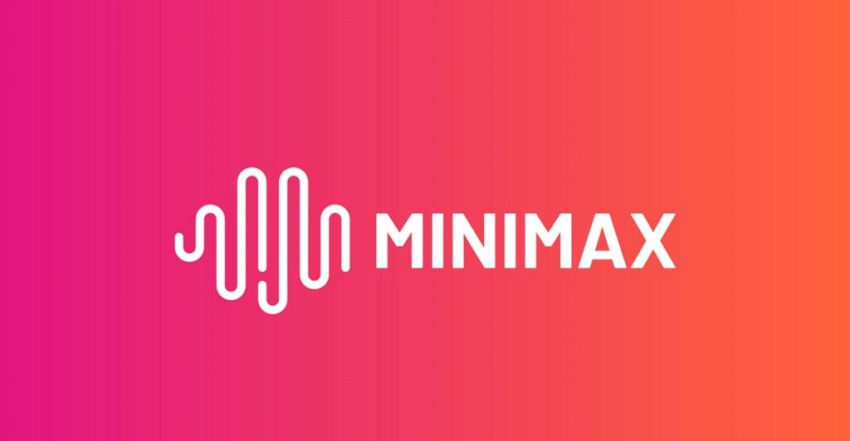
Key Features
1. Instant Voice Cloning
MiniMax is highly efficient at instant voice cloning, capable of creating a custom voice model with as little as 10 seconds of clean audio. Reviewers and users have praised the quality of MiniMax's voice clones, noting that they sound natural and are difficult to distinguish from the original speaker.
And once a voice is cloned, users can adjust settings like emotion, speed, pitch, and volume within the text-to-speech interface to further refine the output. The platform also includes a noise reduction feature that helps users remove background noise from their audio sample before cloning, ensuring a cleaner final voice.
2. Text-to-Speech (TTS)
MiniMax boasts a large library of over 300 pre-made AI voices across more than 50 languages and multiple accents. The platform provides granular control over the generated speech, allowing for adjustments to emotion, tone, and pacing. Its advanced model is designed to adapt pacing and emotion based on the text context, ensuring a coherent and lifelike flow, especially for long scripts.
3. Multilingual Support
MiniMax supports voice generation and cloning in over 50 languages, with a high degree of accuracy in replicating accents and preserving linguistic nuance.
4. Generous Free Plan
MiniMax offers one of the most generous free tiers among its competitors. Users can receive 10,000 credits to start, which can be used for text-to-speech and voice cloning. Some promotions have offered 4,000 free credits daily.
- Exceptional Voice Quality: The platform is highly praised for producing ultra-realistic and emotionally expressive voices.
- Fast and Efficient Cloning: With just 10 seconds of audio, MiniMax can produce impressive voice clones, saving time and effort.
- Generous Free Tier: The free offering provides significant value for experimentation and personal projects.
- User-Friendly Interface: The platform is designed to be easy to use, even for beginners.
- Strong Competitive Position: Seen as a major competitor to ElevenLabs, particularly in voice cloning quality and value.
- Less Established: As a newer player, it may have a smaller community and fewer tutorials compared to platforms like ElevenLabs.
- Credit System: While generous, the credit system can be less predictable for users with varied needs compared to fixed-length subscriptions.
- Potential for Free Plan Changes: Given its generous free offering, the exact features included on the free tier may change over time as the platform evolves.
6. Supertone Play
Best AI Voice Cloning Software for Good-Quality Text-to-Speech
Supertone Play is an AI voice tool developed by Supertone, a South Korean tech company that was acquired by the entertainment company Hybe (the agency behind the band BTS). Leveraging its experience in producing voice technology for music, Supertone created Play as a text-to-speech (TTS) service with advanced voice cloning and emotional expression capabilities.
Supertone Play is an excellent choice for content creators, game developers, podcasters, and video makers who need a high-quality, emotionally expressive voice-cloning tool with a generous free plan. Its speed and multilingual capabilities make it ideal for anyone who needs to produce content quickly and for a global audience. The free tier is especially valuable for students and creators starting out who need a powerful tool for personal projects.
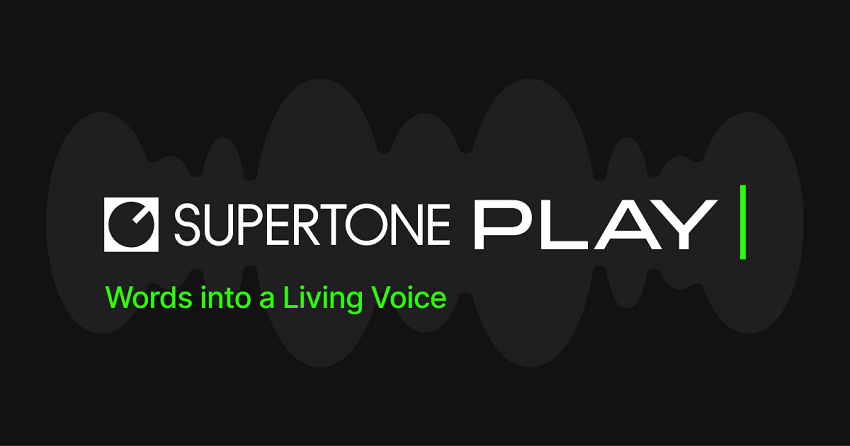
Key Features
1. Instant Voice Cloning
Supertone Play can generate a custom AI voice from a short audio sample - just 10 seconds of clear speaking. And the voice cloning feature works across multiple languages. You can train your voice in one language and use it to generate speech in another, such as Korean, English, and Japanese, with plans to expand to more languages.
To ensure responsible use and prevent misuse, the platform requires users to complete a "Voice Captcha" script-reading exercise to verify their identity and consent.
2. Text-to-Speech (TTS)
The platform provides access to a large library of over 190 pre-made "character voices" for various applications, such as narration, games, and podcasts. Its AI model is trained to generate speech with rich emotional depth and nuanced vocal performance, allowing for more natural and engaging audio output. Users have granular control over various aspects of the generated voice, including pitch shift, pitch variance, and speech speed.
3. Other AI Tools
- Supertone Shift: Supertone also offers a real-time voice conversion tool, Supertone Shift, which allows artists to alter and clone their voices during live performances.
- Supertone Clear: This is a plug-in for removing noise and reverb to enhance the quality of voice recordings.
4. Generous Free Plan
Supertone Play has a highly competitive free tier. It provides 3,000 credits (approximately 5 minutes of audio generation) per month, which includes unlimited voice cloning and unlimited downloads for personal use.
- Quick and easy voice cloning: With just 10 seconds of audio, you can generate a personalized voice, making it one of the most efficient options available.
- Generous free offering: The unlimited voice cloning and downloads on the free plan make it highly attractive for users wanting to experiment without financial commitment.
- High-quality emotional voices: The emotional range and expressiveness of the generated voices are suitable for professional content, rivaling top competitors.
- Strong multilingual capabilities: The ability to train a voice in one language and use it for multilingual content production is a powerful feature.
- Less established in the West: Being newer to the Western market, there is less community support and fewer tutorials compared to established platforms like ElevenLabs.
- Potential for credit burn: As with many credit-based systems, complex or long generations could consume credits quickly, potentially surprising new users.
- Credit limits on paid plans: The monthly credits do not carry over to the next month, which may be a drawback for users with inconsistent or heavy usage.
7. Voice.ai
Best Real-Time AI Voice Cloning Software for Gaming or Online Chat
Voice.ai is a multi-purpose platform known primarily for its free real-time voice changer, popular with gamers, streamers, and online chat users. The platform also features voice cloning capabilities, but its free offering comes with significant limitations that primarily allow users to test the functionality rather than create and download production-ready audio.
Voice.ai is best for gamers and streamers who want a fun, free way to alter their voice in real-time. For users who need high-quality voice cloning for professional projects like podcasts, audiobooks, or long-form video, its restrictive free plan and average audio quality make it a less suitable option than dedicated platforms.
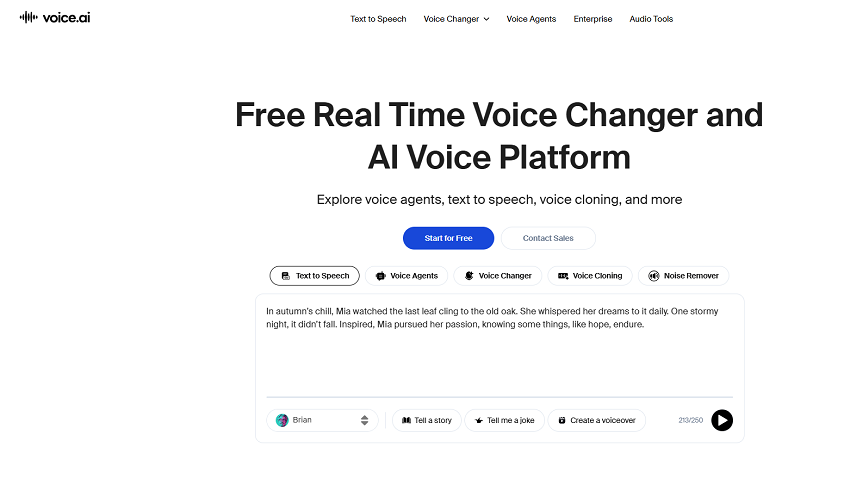
Key Features
1. Real-Time Voice Changer
Voice.ai uses advanced AI to transform voices in real-time, allowing users to alter their voice's gender, style, and tone. The tool works seamlessly with popular gaming and streaming apps like Discord, Twitch, and Zoom, enabling users to surprise their audience with new personas or add unique sound effects during live sessions. Users can create and play custom sound clips or memes directly through the application to enhance their online interactions.
2. Voice Cloning
The platform includes a text-to-speech feature that can be powered by a cloned voice. This allows users to type a script and have their generated voice read it aloud. Users can create their own voice model by uploading a high-quality audio sample. The AI analyzes the sample to capture the speaker's nuances, tone, and inflection.
3. Other Online Audio Tools
In addition to its voice features, Voice.ai offers several other free audio editing tools directly on its website:
- Audio Enhancer: Removes background noise.
- Vocal and Echo Remover: Isolates vocals or removes unwanted reverb.
- Audio Converter: Changes audio file formats.
4. Free Plan
The voice-changing software is free to download and use, but its voice cloning functionality is much more restricted. Free users can create one voice clone and generate a limited amount of text-to-speech audio (e.g., 500 characters).
- Free real-time voice changer: The core voice-changing application is completely free and widely used in the gaming and streaming community.
- Easy to use: The platform is designed with a user-friendly interface, making it accessible even for beginners.
- Additional tools: The free audio editing tools are a valuable addition for content creators who need to perform quick edits.
- No free downloads for voice clones: The inability to download cloned audio on the free plan severely limits its usefulness for serious voice cloning projects.
- Average voice quality: While functional, the generated audio from cloned voices has been rated as only average compared to competitors, with some noting the output can sound unnatural.
- Focus on entertainment: The platform is heavily geared toward real-time voice changing for entertainment, with its cloning features being secondary and less refined.
8. Veed.io
Best AI Voice Cloning Software for All-in-One Video Editing
VEED.io is a web-based video editing platform that has integrated a range of AI features, including text-to-speech and voice cloning. Unlike a standalone voice generator, VEED is a full-featured video production suite, making its voice tools ideal for creators who need a unified workflow for editing videos, adding voiceovers, and generating captions.
VEED.io is best for video creators, social media managers, and marketers who want an all-in-one platform to quickly produce video content. If your primary need is to streamline your video production pipeline and use voice cloning for simple narrations or corrections, VEED offers a compelling, browser-based solution. However, for users demanding the highest quality voice synthesis or those working on audio-only projects, a dedicated voice platform might be a better choice.
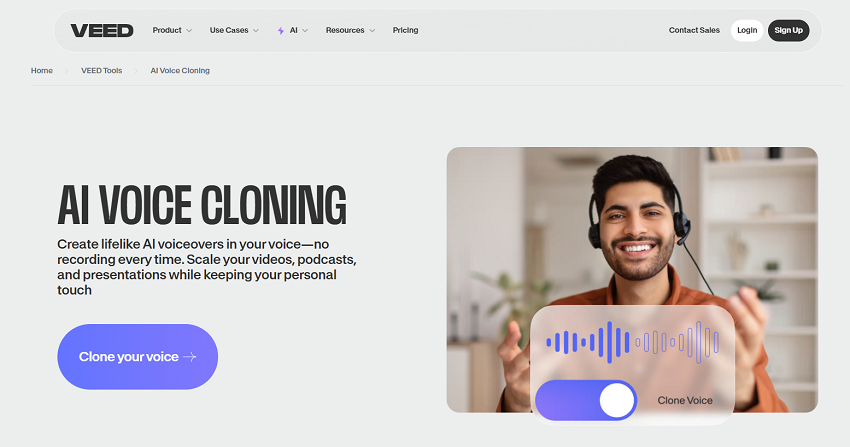
Key Features
1. Voice Cloning
You can create an AI voice clone in minutes by reading a brief script within the app's "Text-to-Speech" tool. This creates a "voice profile" that captures your unique vocal patterns. Once your voice is cloned, you can type text and have your custom AI voice replica read it with natural-sounding emotion. To ensure responsible use, VEED requires users to read a terms of service agreement as part of the cloning process. The platform explicitly prohibits cloning other people's voices and has safeguards to prevent impersonation.
2. Text-to-speech (TTS)
For those who don't want to clone their own voice, VEED offers a library of over 50 preset AI voices with different genders, personalities, and accents. You can adjust the speed, pitch, and emphasis of the generated voice to better match your content's tone. The TTS feature is available in over 50 languages, helping creators reach a global audience.
3. All-in-One Video Editor
- Script-to-Video: Users can generate entire videos from simple text prompts, adding stock footage, images, and AI avatars.
- AI Avatars: HeyGen-style AI avatars can be generated from either preset options or by cloning a custom face, which you can combine with your cloned voice.
- AI Dubbing and Translation: The AI voice dubber tool can automatically translate and replace spoken audio in a video with a new language.
- Other Tools: The platform includes automatic captions, noise reduction, and video trimming, all within a single interface.
4. Free Plan
The free tier allows users to try the voice cloning tool with a limited quota and a character limit of 2,000 per project. However, all exports will have a VEED watermark.
- Comprehensive Suite: The voice cloning is integrated with a powerful and user-friendly video editor, eliminating the need to switch between different programs.
- Quick Cloning: The process to create a voice profile is very fast, requiring only a short audio sample.
- Beginner-Friendly: The platform is designed to be intuitive, making it accessible for new creators.
- Limited Free Plan: The free offering is restricted, with a persistent watermark on exports and a tight quota on voice cloning usage.
- Performance Issues: Some users have reported inconsistent editing performance, with lag and buffering issues, particularly for longer or higher-resolution video files.
- Potential for High Cost: For users who need high usage of AI features, the credits can add up, and some features are gated behind higher-tier plans.
- Ethical Concerns: While safeguards are in place, the tool's marketing of "voice mimicking" has raised ethical questions.
9. KwiCut
Best Browser-Based AI Voice Cloning Software
KwiCut is a web-based, AI-powered video and audio editing tool that offers voice cloning as one of its key features. The platform is designed to make content creation more efficient by offering a text-based editing workflow, similar to Descript, where users can edit their media by manipulating the automatically generated transcript.
KwiCut is best for content creators, particularly YouTubers and podcasters, who need an efficient, all-in-one web-based editor. It's a strong option for those who want to quickly produce polished video and audio content, correct mistakes using their cloned voice, and generate transcripts and captions with minimal effort. Its generous free offering with commercial rights makes it an excellent choice for creators on a budget.
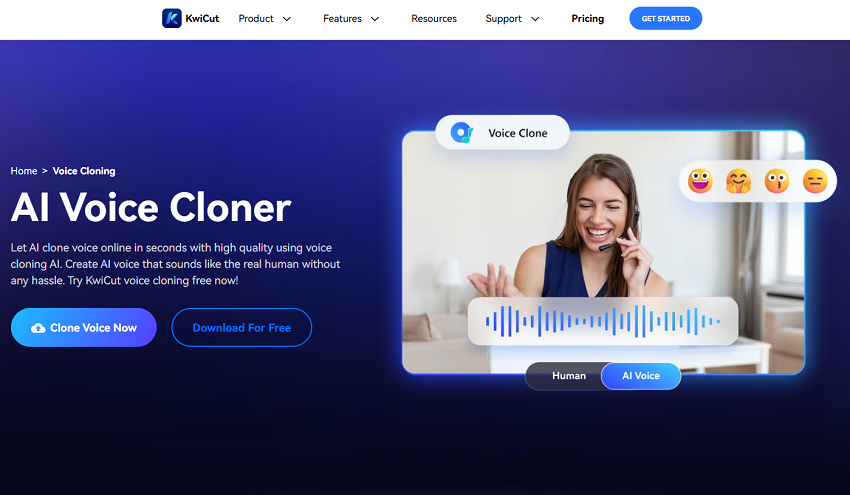
Key Features
1. Voice Cloning
KwiCut allows users to clone their voice directly in their web browser without needing to download any software. The platform can create a digital voice model with as few as one to five audio samples, according to its documentation. For higher quality, it encourages users to provide longer audio input, as the AI uses these samples to replicate nuances like accent, tone, and emotion.
KwiCut claims to produce studio-quality voices that sound natural and authentic. The platform assures users that they retain full commercial rights to any voice they clone.
2. Text-Based Editing
KwiCut transcribes the audio from your uploaded video or audio file. You can then edit the text transcript to automatically edit the corresponding media. This includes deleting words, which in turn removes that audio from the recording. Its dedicated AI feature automatically detects and removes common filler words like "um" and "uh" from your transcript and audio.
The platform also includes an AI noise reducer that can automatically remove background noise, such as echoes, clicks, and humming, to clean up your audio.
3. Additional AI Tools
- AI Video Generator: KwiCut offers a text-to-video tool, allowing users to generate video content from a script, complete with voiceovers.
- Auto-Subtitles and Captions: The platform can automatically generate subtitles that are synchronized with the video or audio.
- AI Copilot: A feature that can help with generating titles and descriptions for social media posts, leveraging GPT-4.0 technology.
4. Free Trial
KwiCut offers a free version that includes voice cloning and other AI editing tools. However, the free version has significant restrictions. Luckily, there is a 7-day free trial is available for new users, offering a chance to test the full set of features.
- Seamless Workflow: Its combination of voice cloning with text-based editing makes it a powerful and efficient tool for video and podcast creators.
- Quick Cloning: The ability to create a high-quality voice model with minimal audio input is a major benefit.
- Free Commercial Rights: The commercial licensing on cloned voices, even within the free tier, is a significant advantage for creators.
- Full-Featured Editor: The platform's integrated video and audio editing features, such as noise removal and transcription, save time and effort.
- Limited Free Usage: The free version is primarily a "trial" and is not suitable for large or continuous projects without upgrading.
- Performance: Some users have reported inconsistent performance, with potential lag depending on the complexity of the project.
- Ethical Concerns: Like other platforms, the potential misuse of voice cloning technology, including replicating voices without consent, is a concern, though KwiCut does have safeguards.
10. OpenVoice AI
Best Open-Source AI Voice Cloning Software for Developers and Advanced Users
OpenVoice is a versatile, open-source AI model designed for instant voice cloning. Developed by MyShell and MIT, it distinguishes itself from commercial, paid alternatives by offering a powerful and flexible solution at no cost. It is primarily geared toward developers, researchers, and tech-savvy users, as its usage is not as straightforward as a simple web application.
OpenVoice is the best option for developers, AI researchers, and tech-savvy hobbyists who want full control over their voice cloning projects. It is the ideal choice for building custom applications, experimenting with cutting-edge AI, or integrating voice technology into products without licensing fees. For casual users, the technical requirements make it a less practical choice than commercial platforms with user-friendly interfaces.
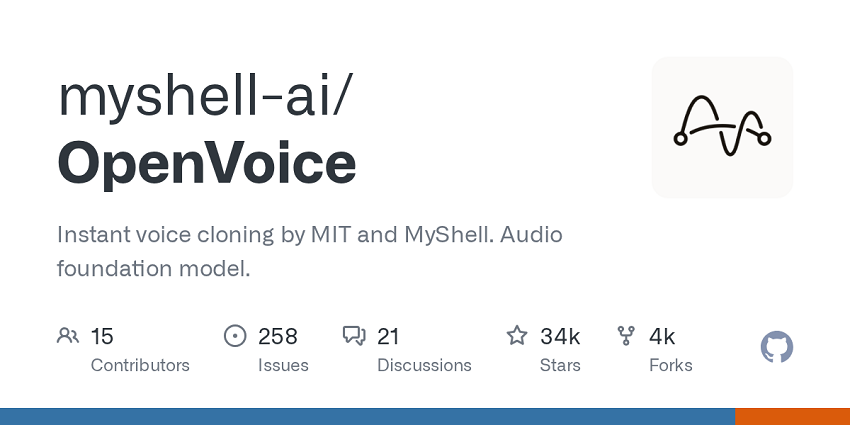
Key Features
1. Instant Voice Cloning
OpenVoice can clone a voice from a very short audio clip, with some demos showing success with as little as 30 seconds. It is highly regarded for its ability to accurately replicate the tone color and nuances of a speaker's voice. Unlike other models, OpenVoice separates the tone color (the unique vocal timbre) from other speech attributes like emotion, accent, and rhythm. This allows for more flexible and precise control over the final output.
2. Voice Style Control
Because of its decoupled architecture, users can apply a wide range of styles to a cloned voice, such as emotion (e.g., sad, happy, angry), rhythm, and intonation, which are not directly copied from the reference speaker.
One of OpenVoice's most impressive features is its Zero-shot Cross-lingual cloning. It can take an audio sample of a voice in one language and generate new speech in another language while maintaining the original speaker's vocal characteristics.
3. Technical Advantages
OpenVoice is built to be efficient, requiring significantly fewer computational resources than many commercial text-to-speech APIs. This makes it a more accessible option for developers and researchers.
4. Open Source and Free Commercial Use
As all of its versions are released under the MIT License, they are completely free for both commercial and research purposes. This makes it an ideal foundation for building new applications.
However, it is not a ready-to-use application and requires some technical knowledge to run.
- GitHub Repository: The model, along with instructions and documentation, is available on the GitHub repository for MyShell AI, where developers can access the source code and pre-trained models.
- Online Demos: For non-technical users, there are various online demos and services that utilize OpenVoice, such as those hosted on Hugging Face and Replicate, where you can test the cloning feature.
- Local Installation: To remove limitations and gain full control, users need to clone the repository and run the model locally, which requires a setup involving Python and other dependencies.
- Cost-Effective: It's a completely free solution for developers, with an open commercial license.
- High-Quality Results: It rivals commercial solutions in quality, especially when it comes to replicating the voice's unique tone.
- Maximum Flexibility: The decoupled architecture provides granular control over style, emotion, and language.
- Transparent: Being open source allows for transparency, customization, and community contributions.
- Technical Barrier: It is not a beginner-friendly, drag-and-drop tool. Users need technical skills to set it up and run it, particularly for local deployment.
- Setup Complexity: The installation process can be difficult for some users, with potential issues depending on the operating system.
- Accent Inconsistency: Some users have reported issues with accents being flattened or changed during cloning, though the core tone color is accurately preserved.
- Inconsistent Performance: The quality can be inconsistent, especially with local setups, and may not match the polish of a commercial service like ElevenLabs.
Pro Tip: Enhance Your Video Quality with Aiarty Video Enhancer
Once you've explored the remarkable capabilities of these AI voice cloning tools, it's important to remember that stunning audio deserves equally impressive visuals. To elevate your content further, Aiarty Video Enhancer offers state-of-the-art AI-powered video upscaling and enhancement.
Leveraging advanced AI algorithms, Aiarty specializes in upscaling video resolution, reducing noise, and restoring detail in old or low-quality footage. This tool is perfect for creators who want their videos to match the high fidelity of AI-generated voices. Whether you're refreshing vintage content or polishing new recordings, Aiarty Video Enhancer ensures your visuals are crisp, clear, and professional. Combined with AI voice cloning, it creates a seamless multimedia experience that truly stands out.
Conclusion
AI voice cloning has moved from a fringe technology to a practical tool for creators across various fields. As we've seen, the "best" software depends entirely on your specific use case.
ElevenLabs and MiniMax stand out for raw voice quality, making them ideal for professionals focused on audiobooks or high-end voiceovers. For video-centric creators who need an all-in-one editing and cloning workflow, Descript and VEED.io are hard to beat. Meanwhile, platforms like HeyGen and KwiCut offer specialized features, such as AI avatars and text-based editing, that can accelerate your content production. Finally, for those with a technical background, the open-source power of OpenVoice AI provides unparalleled flexibility at no cost.
Before diving in, consider your project's needs and the limitations of each free tier. Most offer generous allowances for experimentation, but you'll likely need a paid plan for commercial use. Ultimately, this technology offers a new world of creative possibilities. By carefully weighing the options and understanding their strengths, you can harness the power of AI voice cloning to create content that is more engaging, efficient, and innovative than ever before.